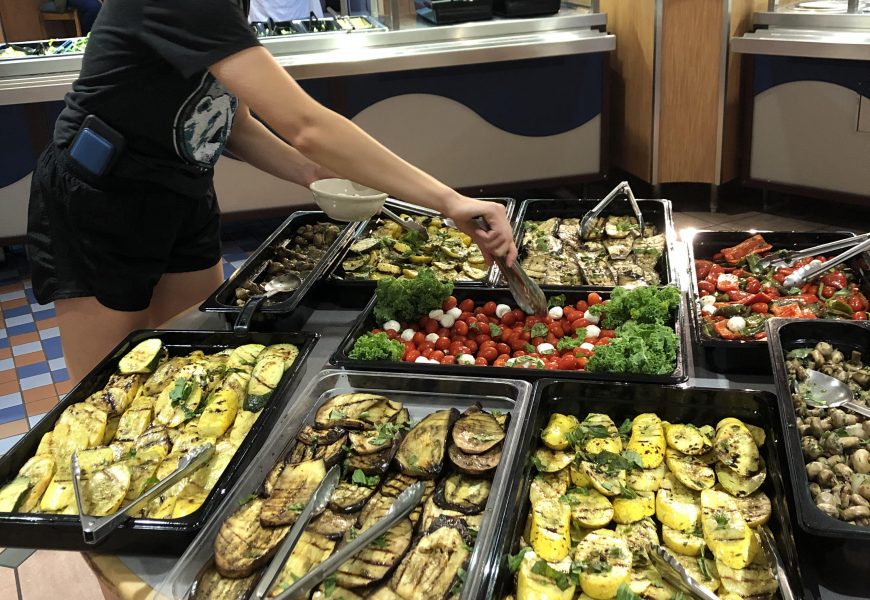I’m not here to judge. Whether you are a meat-eater, a vegan, or somewhere in between, it is a fact that meat is not the most “environmentally-friendly” food. Worldwide, greenhouse gases from livestock production fall second only to electricity and heat production production, making up 24% and 25% of emissions respectively as of 2014 (statistics taken from the Intergovernmental Panel on Climate Change, 2014). There seems to be more focus on structural changes today, but there is plenty that individuals can do to cut down on their associated greenhouse gas production.
Being an Environmental Studies major and scholar in the Goodwin Niering Center for the Environment, Meatless Monday is something that I have heard a lot about. So, I was pleasantly surprised to hear that the Office of Sustainability would be hosting a (Mostly) Meatless Monday. On Monday, October 7th, the Office of Sustainability held this “(Mostly) Meatless Monday” dinner in Harris. “Why the ‘mostly’?” you may ask… In previous years, the Office of Sustainability attempted to implement “Meatless Monday” as a regular occurrence. This plan was met with backlash from athletes and other students. People mostly had an issue with the lack of choice they had, whether they chose to eat meat or not.
At the latest “Meatless Monday,” there were meat options, but less than usual. There was an emphasis on vegetarian options, including an array of roasted vegetables, falafel, and new veggie burgers. The point of a Meatless Monday is not to prevent people from eating what they want, but rather to spark thought and discussion surrounding what we eat and how that impacts the environment. That is why Harris still offered meat options while highlighting new vegetarian alternatives. The college also wants to lower its carbon footprint. Reducing the amount of meat purchased and served in the dining hall can reduce the college’s negative environmental impact. Based on data from July 1, 2018 to June 30, 2019, Connecticut College students consumed approximately 14,197 lbs of deli meats, 25,607 lbs of pork, 22,000 lbs of beef, and 106,550 lbs of chicken. While simply serving fewer meat option one meal per week (dinner on Mondays) will not reduce our consumption greatly, it is a step in the right direction.
There are many reasons that people choose to eat less meat (or none at all): health, ethics, environment, etc. More meatless options are important for all of these reasons. The purpose of a Meatless Monday is to encourage more sustainable food habits. The production of meat requires a lot of resources, like land and feed for the livestock, and is a factor in greenhouse gas emissions. In addition, the razing of forests to provide more farmland is responsible for an extra 2.8 billion metric tons of carbon emissions per year. The production of just 1 kg of beef requires 34.6 kg CO2 equivalents. Even just cutting down beef consumption could help, as the same amount of chicken meat produces 4.57 kg CO2 equivalents (Environmental Impacts on Food Production and Consumption).
SustainabiliTeam Fellows were present during Harris dining hours to inform people about why this Meatless Monday event was important and how it helps us, as a college, to be more sustainable. Students had the opportunity to pledge their support for a Meatless Monday as they entered Harris. There were also short surveys that asked about people’s support of a Meatless Monday every week. Having the option of eating meat seems important to students. According to survey results, only 55% of students said that they would support a fully meatless Monday, but 75% stated they would support a mostly meatless Monday. 75% is great- but why are more people not supportive of limited meat options for Monday dinners?
Senior Emma Brooks ‘20 stated; “I think that we are misguided about nutrition. A lot of people think it is important to have meat in their diets. People who know and care about sustainability are supportive [of Meatless Monday], but others are just apathetic.” On a similar note, Ella Rumpf ‘21 claimed that the lack of support for Meatless Mondays may be because “people don’t know where to get plant-based protein.” Of those surveyed, 16% of students chose against going meatless “because of protein.” The majority of Americans eat more protein than they need- nearly two times the recommended amount (Physicians Committee for Responsible Medicine). Plant-based protein sources include tofu, chickpeas, lentils, broccoli, quinoa, and almonds, just to name a few. Tofu, beans, and quinoa are nightly staples at Harris and the dining halls add other plant protein options quite regularly.
Having a Mostly Meatless (or Totally Meatless) Monday will not solve all of our issues, but it is one small, yet important step in taking real action, especially for a college that prides itself on sustainability and environmental consciousness. •










